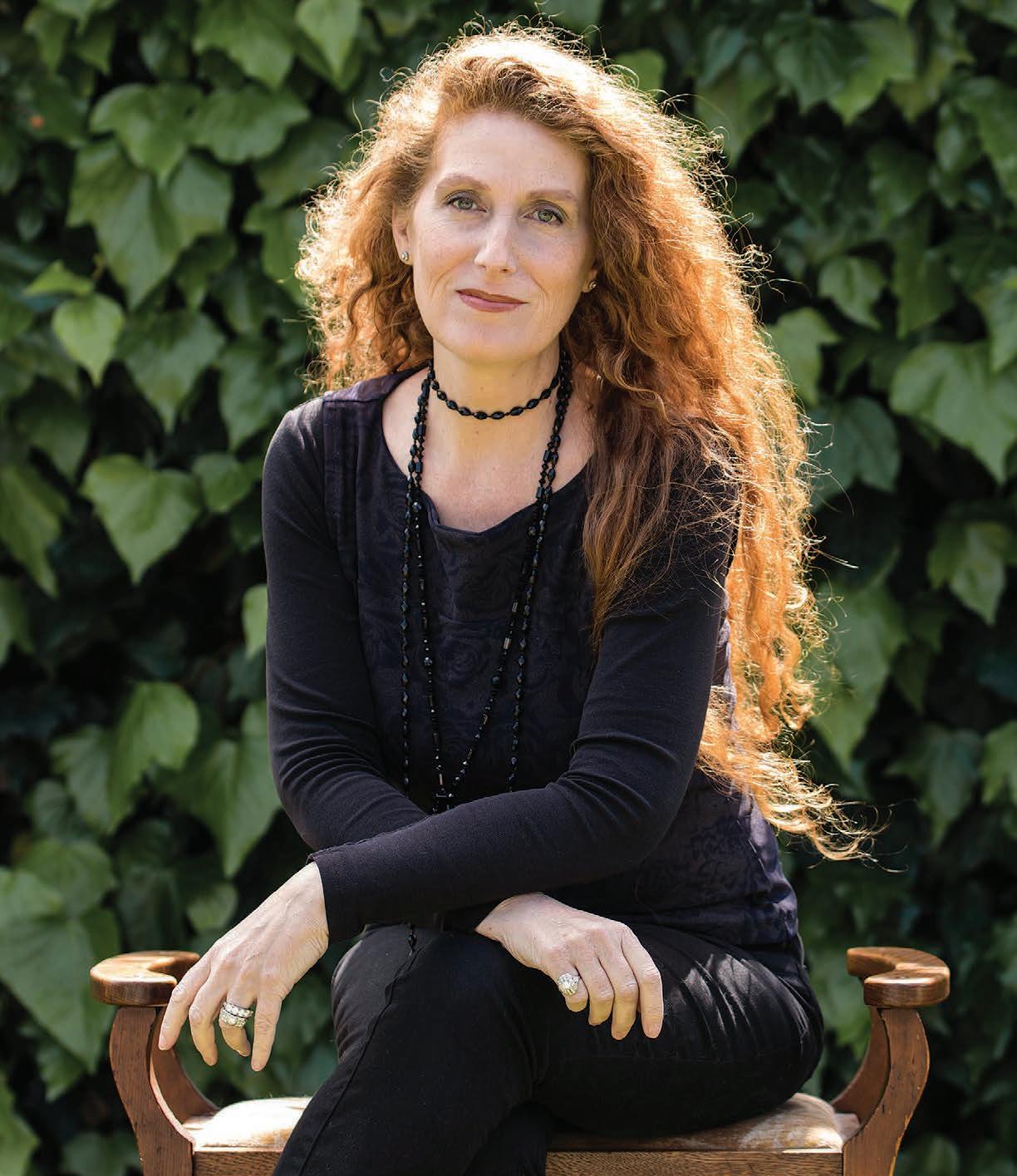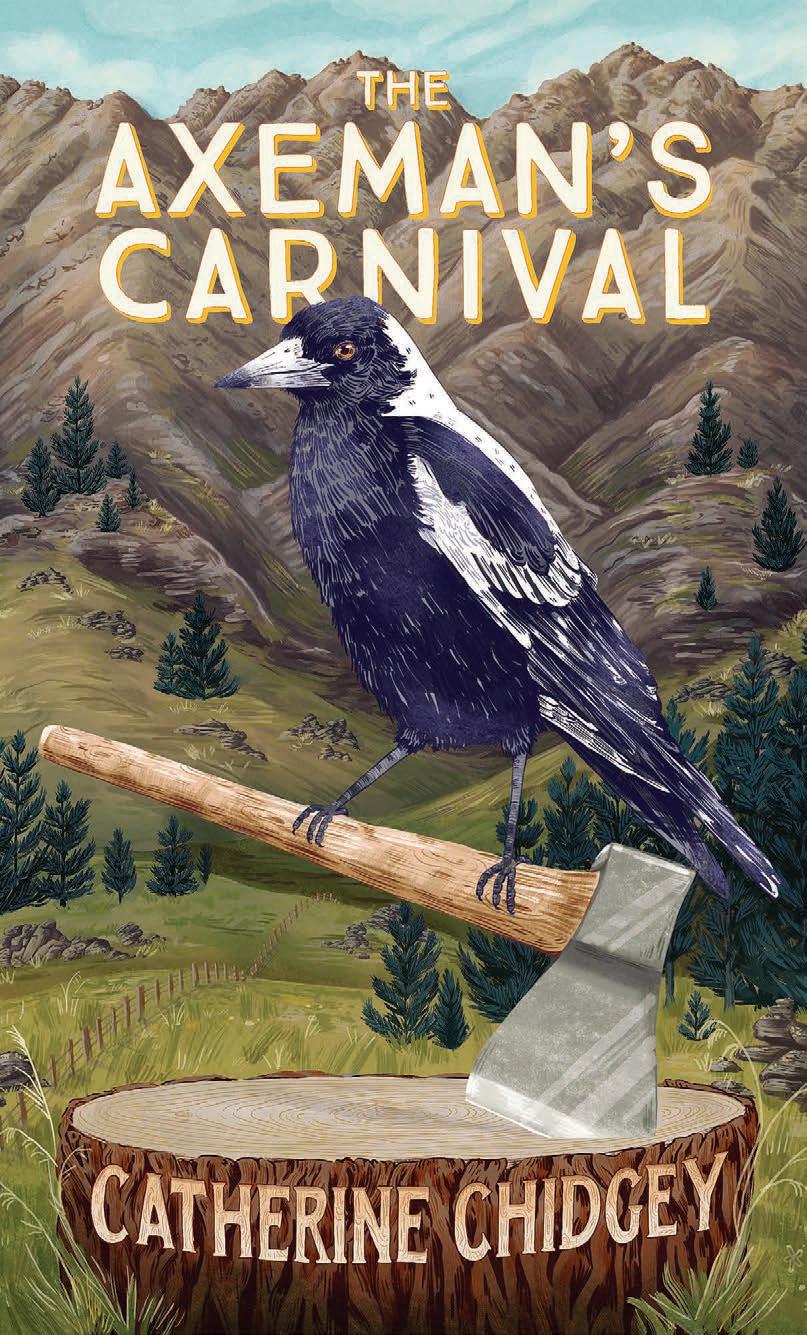
4 minute read
People � � � � � � � � � � � � � �
A bird’s-eye view of farming life
COUNTRY MUSIC: Catherine Chidgey’s new book tells the story of Marnie and Rob, a young farming couple, through the eyes of a magpie. Photo: Helen Mayall SHELF LIFE: Chidgey says Rob faces the same challenges as other farmers right now.
Denis Glover’s magpie watched on as Tom and Elizabeth lost the farm in his much-loved 1964 poem. In acclaimed author Catherine Chidgey’s new novel The Axeman’s Carnival, it is again a magpie that bears witness to a farming couple’s struggles. She spoke with Bryan Gibson.
AFTER taking readers to 1890s Florida and Nazi Germany in her recent work, Catherine Chidgey chose the Central Otago high country as the setting for her latest book, The Axeman’s Carnival.
It’s a landscape Chidgey brought to life with the help of her late mother in-law’s diaries, which detail a farming life in the high country.
Through Marnie and Rob, a young farming couple, the book resonates with many of the challenges farming families face right now.
Rob is a generational farmer, striving to succeed in the face of a changing market while dealing with the bad decisions his father made.
Marnie struggles to overcome the isolation of farming life and that’s where Tama, the star and narrator of the novel, comes in.
Tama is just a helpless magpie chick when Marnie rescues him, and this is where his story might have ended.
“If it keeps me awake,” Rob says, “I’ll have to wring its neck.”
But Tama provides a new opportunity for the struggling couple. As Marnie seeks connections unavailable to her on the farm, Tama’s internet fame grows and opens doors to new possibilities.
Chidgey says the decision to write about the high country came from years of hearing her husband Alan Bekhuis talk about his childhood on the farm.
“Also reading his mother’s diaries about their time on a sheep station. I started reading them about three years ago after she died and it just sparked in me a memory of my love for that landscape. The place is so different in lots of ways from the rest of New Zealand, it’s atmospheric and beautiful and magical but quite a demanding place to live in and to farm.”
And what about the magpie narrator?
“I have a busy life, teaching creative writing at the University of Waikato and then writing full-time, and the only way I can fit that in is to get up very early, before dawn.
“I’d be going to my writing room every morning and opening my window and in would flood this very melodious dawn song of the magpies. One day it just clicked – they’re right there, the voice of your book is right there.”
The magpie’s skill as a mimic is central to the book, with Tama’s echoing of phrases he’s heard the human characters say providing comedy and poignance to the plot.
As strangers in a strange land, the magpies and Marnie share some common ground as well.
“Tama is absolutely an outsider. For a start he’s an Australian but he’s also a creature that belongs to the wild, who Marnie tries to domesticate. He’s the outsider who’s able to function as a witness.”
What Tama witnesses is often confronting, with domestic violence, isolation and financial stress buffeting the farming couple.
Chidgey says Rob faces the same challenges as other farmers right now.
“The pressure to diversify and embrace the next big thing and be ahead of the game – the pressure of taking that kind of risk.
“Rob is a traditional bloke and he wants to stick with what he knows, and what he knows is sheep. But what he knows and what he’s always done isn’t necessarily earning him a livelihood so he’s under this incredible pressure.
“He’s also inherited the bad choices that his father made about farming that land so he’s saddled with those generational problems. But he’s quite resistant to the risk of making big changes.
“He is the villain, I suppose, but I feel a lot of sympathy for Rob and I’m never interested in writing one-dimensional bad guys.”
A champion wood-chopper, Rob is also feeling the next, younger, generation of athletes breathing down his neck as he prepares for the region’s big event – the Axeman’s Carnival.
Chidgey says researching the book was a lot of fun. As well as having her mother in-law’s diaries and her husband’s experiences to draw on, she interviewed a number of high country farmers and wood-choppers to make sure the novel portrayed the farming life faithfully.
She also called on her cousin, AgriHQ analyst Suz Bremner, for advice.
“I absolutely love those moments when I’m deep in research and I stumble across something that I didn’t know would form a real key part of the book. It’s those gems of research that you don’t know you don’t know, and when you stumble upon them there’s a moment when it clicks into place and the book moves forward in an interesting and unexpected way.”





